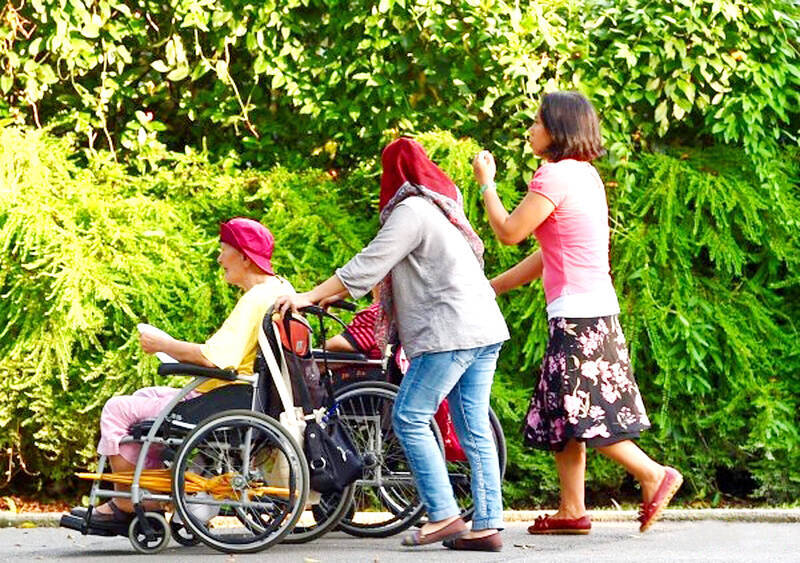With Taiwan expected to become a “super-aged society” next year, the government plans to introduce the Long-term Care 3.0 program in the first half of next year to provide elderly people with more comprehensive care and allow home caregivers to have a breather, Vice Premier Cheng Li-chiun (鄭麗君) said on Friday.
Cheng in a media interview said that a cross-ministerial long-term care task force under the supervision of the Executive Yuan is working out the details of the plan, with the new program expected not only to take care of more elderly people, but also integrate local healthcare services with welfare mechanism to build a complete long-term national care system.
SUPER-AGED SOCIETY

Photo: Taipei Times
The WHO defines a super-aged society as one in which 20 percent of the population is aged 65 or older, while an “aged society” is one in which 14 percent of the population is aged 65 or older, and an “aging society” is one in which 7 percent of the population is in this category.
According to the definitions, Taiwan became an aging society in 1993, and an aged society in 2018. Next year, the country would become a super-aged society.
President William Lai (賴清德) in his inauguration speech on May 20 spoke about the goal of achieving a “healthier Taiwan.”
To achieve it, the government has put measures in place such as the Long-term Care Plan 3.0 to strengthen care services for elderly people by increasing the number of care facilities and integrating national healthcare and welfare resources.
Since former president Tsai Ing-wen (蔡英文) unveiled the Long-term Care Plan 2.0 in 2016, the budget and the number of service providers and venues that provide such care have increased significantly, Cheng said.
In the past three years, the percentage of people needing care who have received care has been on the rise as the government intensified efforts to provide services. Last year, the ratio was 80.19 percent, up from 69.51 percent in 2022 and 56.60 percent in 2021.
Taiwan has set a goal of serving 87 percent of people who need care over the next four years by improving its long-term care services.
As part of the Long-term Care Plan 2.0, Taiwan has set up a greater number of venues in many neighborhoods to provide home care, dining and health promotion services, Cheng said.
REDUCING BURDEN
The Long-term Care Plan 3.0 would focus on families that need to take care of their members with severe illness, as they shoulder a heavier financial burden, Cheng said, adding that the upcoming plan would provide diversified and continued care for these groups.
Cheng said she has seen critically ill people being discharged from hospitals, but soon being rushed back to emergency rooms, as their illness deteriorated and family members encountered difficulties taking care of them.
Many people admitted into caregiving institutions frequently return to hospital, which places a psychological strain on the families, Cheng said, adding that it is the government’s responsibility to strengthen the healthcare network so that people receive high-quality care whether at home or in a caregiving institution.

SEPARATE: The MAC rebutted Beijing’s claim that Taiwan is China’s province, asserting that UN Resolution 2758 neither mentions Taiwan nor grants the PRC authority over it The “status quo” of democratic Taiwan and autocratic China not belonging to each other has long been recognized by the international community, the Mainland Affairs Council (MAC) said yesterday in its rebuttal of Beijing’s claim that Taiwan can only be represented in the UN as “Taiwan, Province of China.” Chinese Minister of Foreign Affairs Wang Yi (王毅) yesterday at a news conference of the third session at the 14th National People’s Congress said that Taiwan can only be referred to as “Taiwan, Province of China” at the UN. Taiwan is an inseparable part of Chinese territory, which is not only history but

CROSSED A LINE: While entertainers working in China have made pro-China statements before, this time it seriously affected the nation’s security and interests, a source said The Mainland Affairs Council (MAC) late on Saturday night condemned the comments of Taiwanese entertainers who reposted Chinese statements denigrating Taiwan’s sovereignty. The nation’s cross-strait affairs authority issued the statement after several Taiwanese entertainers, including Patty Hou (侯佩岑), Ouyang Nana (歐陽娜娜) and Michelle Chen (陳妍希), on Friday and Saturday shared on their respective Sina Weibo (微博) accounts a post by state broadcaster China Central Television. The post showed an image of a map of Taiwan along with the five stars of the Chinese flag, and the message: “Taiwan is never a country. It never was and never will be.” The post followed remarks

NATIONAL SECURITY: The Chinese influencer shared multiple videos on social media in which she claimed Taiwan is a part of China and supported its annexation Freedom of speech does not allow comments by Chinese residents in Taiwan that compromise national security or social stability, the nation’s top officials said yesterday, after the National Immigration Agency (NIA) revoked the residency permit of a Chinese influencer who published videos advocating China annexing Taiwan by force. Taiwan welcomes all foreigners to settle here and make families so long as they “love the land and people of Taiwan,” Premier Cho Jung-tai (卓榮泰) told lawmakers during a plenary session at the Legislative Yuan in Taipei. The public power of the government must be asserted when necessary and the Ministry of

Proposed amendments would forbid the use of all personal electronic devices during school hours in high schools and below, starting from the next school year in August, the Ministry of Education said on Monday. The Regulations on the Use of Mobile Devices at Educational Facilities up to High Schools (高級中等以下學校校園行動載具使用原則) state that mobile devices — defined as mobile phones, laptops, tablets, smartwatches or other wearables — should be turned off at school. The changes would stipulate that use of such devices during class is forbidden, and the devices should be handed to a teacher or the school for safekeeping. The amendments also say